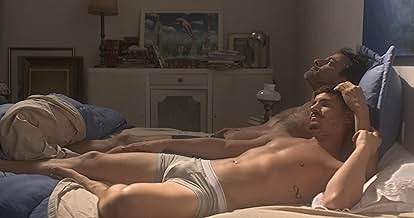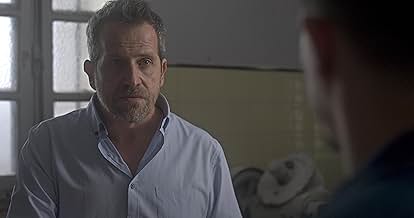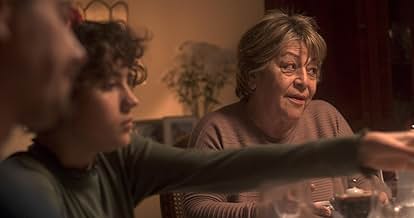VALUTAZIONE IMDb
6,1/10
400
LA TUA VALUTAZIONE
Aggiungi una trama nella tua linguaComing out of he closet is never easy, but the gay son has already come out to his parents. They weren't happy, but they still love him. The son arrives home, only to learn that his partner ... Leggi tuttoComing out of he closet is never easy, but the gay son has already come out to his parents. They weren't happy, but they still love him. The son arrives home, only to learn that his partner has dumped him.Coming out of he closet is never easy, but the gay son has already come out to his parents. They weren't happy, but they still love him. The son arrives home, only to learn that his partner has dumped him.
Recensioni in evidenza
Watched this during the Tampa International Film Fest. The storyline is good, the lead actor did a great job. Moves a bit slow and clunky at first but comes together nicely. The film is really about relationships with family and their expectations. Liked the ending.
Todos tenemos un muerto en el placard o un hijo en el closet (2020) is an Argentinian film shown in the U.S. with the title A Skeleton in the Closet. Literally, the title is translated as We All Have a Skeleton in the Closet or a Son in the Closet. The movie was written and directed by Nicolás Teté.
Coming out of he closet is never easy, but the gay son has already come out to his parents. They weren't happy, but they still love him. The son arrives home, only to learn that his partner has dumped him.
The plot of the movie is what happens after this unpleasant event. It's not easy being gay in a macho family where your brother is a star tennis player and you're not. How the protagonist deals with the situation makes for an interesting movie. The acting and production values are solid.
We saw this film at Rochester's fabulous ImageOut LGBTQ Film Festival. It doesn't have an IMDb rating yet. I rated it 9.
Coming out of he closet is never easy, but the gay son has already come out to his parents. They weren't happy, but they still love him. The son arrives home, only to learn that his partner has dumped him.
The plot of the movie is what happens after this unpleasant event. It's not easy being gay in a macho family where your brother is a star tennis player and you're not. How the protagonist deals with the situation makes for an interesting movie. The acting and production values are solid.
We saw this film at Rochester's fabulous ImageOut LGBTQ Film Festival. It doesn't have an IMDb rating yet. I rated it 9.
Summary:
This dramatic comedy effectively rounds out a story about the "return to payment" where the reconfiguration of family ties after coming out of the closet is combined with the theme of the prodigal son, professional vocation, future work, reunions and pacts and family management, forming a dynamic that does not necessarily have to do only with inbreeding village environments.
Review:
Manuel (Facundo Gambandé) is an architecture student. The film begins with him saying goodbye to his partner who is going to live in Europe. He then undertakes a trip to his hometown (Villa Mercedes, San Luis) to visit his parents, who are going to celebrate their silver wedding anniversary, and request money to travel and meet with his partner. He had not seen them since he had come out of the closet at a family dinner, which led to an argument and his departure from town on bad terms with his parents.
One of the interesting aspects of the film by Nicolás Teté (also the author of the script) is that, precisely, it does not address the moment of coming out but rather the later; he describes how Manuel (whom his parents nevertheless receive very affectionately when he arrives) tries to rebuild the family bond and put it in new terms; a family with a good time, since his father (Diego de Paula) owns a pasta factory.
Another finding is that Manuel is discovering that the family hides a secret, related to an absence that is increasingly being felt in the story, configuring another family problem that somehow "competes" and interferes with his and repeatedly shifts the leading role. Family that he intended and makes the general picture more complex. In this context, Gambandé composes an endearing and at times naive Manu who demands to be understood and accepted, while disappointments and interference with his purposes do not stop.
Teté presents his story as a dramatic comedy, admirably combining both sides of the story and avoiding melodrama. The comedy tone is partly due to the comic imprint (in the best sense) that the character of the mother María Fernanda Callejón gives to in a great performance, and to that displacement mentioned above that also becomes the dramatic core. There is a series of dialogues that exhibit great naturalness, enhanced by several of them being filmed in long still shots.
With all these components, the film achieves a story about the "return to payment" where the reconfiguration of family ties after coming out of the closet is combined with the theme of the prodigal son, professional vocation, future work, reunions and pacts and family management, forming a dynamic that does not necessarily have to do only with inbreeding village environments.
This dramatic comedy effectively rounds out a story about the "return to payment" where the reconfiguration of family ties after coming out of the closet is combined with the theme of the prodigal son, professional vocation, future work, reunions and pacts and family management, forming a dynamic that does not necessarily have to do only with inbreeding village environments.
Review:
Manuel (Facundo Gambandé) is an architecture student. The film begins with him saying goodbye to his partner who is going to live in Europe. He then undertakes a trip to his hometown (Villa Mercedes, San Luis) to visit his parents, who are going to celebrate their silver wedding anniversary, and request money to travel and meet with his partner. He had not seen them since he had come out of the closet at a family dinner, which led to an argument and his departure from town on bad terms with his parents.
One of the interesting aspects of the film by Nicolás Teté (also the author of the script) is that, precisely, it does not address the moment of coming out but rather the later; he describes how Manuel (whom his parents nevertheless receive very affectionately when he arrives) tries to rebuild the family bond and put it in new terms; a family with a good time, since his father (Diego de Paula) owns a pasta factory.
Another finding is that Manuel is discovering that the family hides a secret, related to an absence that is increasingly being felt in the story, configuring another family problem that somehow "competes" and interferes with his and repeatedly shifts the leading role. Family that he intended and makes the general picture more complex. In this context, Gambandé composes an endearing and at times naive Manu who demands to be understood and accepted, while disappointments and interference with his purposes do not stop.
Teté presents his story as a dramatic comedy, admirably combining both sides of the story and avoiding melodrama. The comedy tone is partly due to the comic imprint (in the best sense) that the character of the mother María Fernanda Callejón gives to in a great performance, and to that displacement mentioned above that also becomes the dramatic core. There is a series of dialogues that exhibit great naturalness, enhanced by several of them being filmed in long still shots.
With all these components, the film achieves a story about the "return to payment" where the reconfiguration of family ties after coming out of the closet is combined with the theme of the prodigal son, professional vocation, future work, reunions and pacts and family management, forming a dynamic that does not necessarily have to do only with inbreeding village environments.
Such a cute movie, one of the best ones I have been in a long time. The only down side is a bit slow but I feel that it was needed to give depth to the characters development. Recommended.
This had the potential to be a good film. Sadly, the poor writing, unrealistic scenes and poor acting ruins this. Lead character was good, but it appears none of the adults have any idea what acting is (aside from reciting your lines). There was zero emotional connections to the pivotal scenes. It all seemed so forced and fake. Why include a crying scene by someone who has no idea how to show genuine emotion.
My biggest problem with this: it appears the writer gave up on this story, got tired or was under a deadline. After all the drama and trying to build something meaningful (albeit very poorly) ..suddenly, somehow, all the major problems are resolved and things neatly wrapped up in the last 2 minutes. Ridiculous!!
My biggest problem with this: it appears the writer gave up on this story, got tired or was under a deadline. After all the drama and trying to build something meaningful (albeit very poorly) ..suddenly, somehow, all the major problems are resolved and things neatly wrapped up in the last 2 minutes. Ridiculous!!
Lo sapevi?
- Colonne sonoreTu Veneno
Music by Fernando Lopez Rossi
Performed by Natalia Oreiro
Courtesy of Sony Music Entertainment Inc.
I più visti
Accedi per valutare e creare un elenco di titoli salvati per ottenere consigli personalizzati
- How long is A Skeleton in the Closet?Powered by Alexa
Dettagli
- Data di uscita
- Paese di origine
- Sito ufficiale
- Lingua
- Celebre anche come
- A Skeleton in the Closet
- Azienda produttrice
- Vedi altri crediti dell’azienda su IMDbPro
- Tempo di esecuzione
- 1h 43min(103 min)
- Colore
- Proporzioni
- 1.85 : 1
Contribuisci a questa pagina
Suggerisci una modifica o aggiungi i contenuti mancanti



















